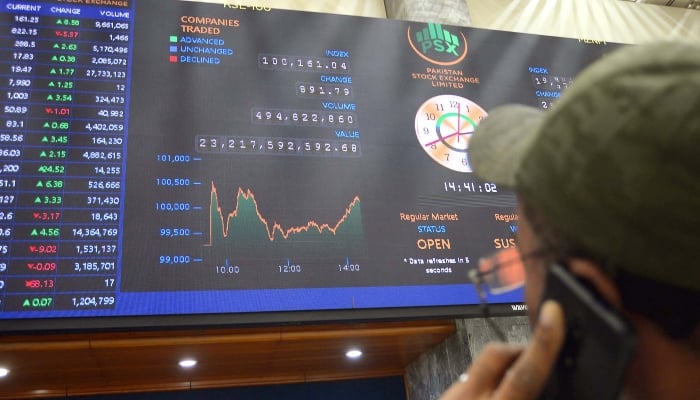
The capital market remained under intense selling pressure on Thursday, continuing its decline from the previous day due to aggressive profit-taking and cautious investor sentiment due to concerns over foreign capital outflows .
The Pakistan Stock Exchange’s (PSX) benchmark KSE-100 index plunged 4,795.32 points, or -4.32 percent, to close at 106,274.97. It was the largest one-day decline in market history, surpassing Wednesday’s historic 3,790-point drop.
Ahsan Mehanti, Managing Director and CEO of Arif Habib Commodities, said: “Stocks (are) bearish on concerns over foreign capital outflows and SBP’s cautious easing policy amid multiple sensitive risks .”
“Consolidation in blue-chip stocks, instability in the rupee and weakness in global crude oil prices played a catalytic role in the bearish activity,” it added.
SBP data showed a sharp increase in profit and dividend repatriations by multinational companies. Repatriations jumped 112% year-on-year to $1.128 billion in the first five months of FY25, reflecting unrestricted dollar outflows amid improving foreign exchange reserves.
November alone accounted for $321.6 million, an increase of 586% year-over-year, although this represents a 22.3% month-over-month decline due to clearing pending payments and reducing restrictions on capital outflows for foreign investors.
Investor concerns have also been heightened by the introduction of the Taxation Laws (Amendment) Bill, 2024, which proposes stringent measures targeting non-filers to broaden the tax base.
Key provisions include banning non-filers from purchasing vehicles over 800 cc, real estate and shares beyond certain limits. The proposed legislation also prohibits non-filers from opening bank accounts or making large financial transactions, while authorizing the Federal Board of Revenue (FBR) to freeze bank accounts, seal properties and block transfers property of non-compliant persons.
These measures have raised fears of reduced consumer spending and liquidity in the banking sector, reinforcing the bearish tone of the market.
Despite the recent pullback in equities, Pakistan’s macroeconomic fundamentals continue to improve, creating a positive backdrop for long-term investor confidence.
The current account posted a surplus of $729 million in November, the highest monthly figure in almost a decade and the highest since February 2015.
For the first five months of fiscal 2025, the current account surplus stood at $944 million, compared to a deficit of $1.67 billion during the same period last year.
This turnaround is explained by a reduction in the trade deficit, a reduction in the services deficit and a reduction in interest and dividend repatriations.
Foreign direct investment (FDI) also showed growth, increasing 31% year-on-year to $1.124 billion in the first five months of fiscal 2025, with significant contributions from China, Hong Kong and of the United Kingdom.
At the same time, remittances rose 29% year-on-year in November, reaching $2.9 billion, bringing the total for the first five months of fiscal 2025 to $14.8 billion. This growth has been supported by government incentives favoring formal banking channels and stable foreign exchange reserves, which now stand at $16.6 billion.
The SBP recently cut the policy rate by 200 basis points, bringing it down to 13%. This is the fifth consecutive rate cut, with inflation falling to 4.9% in November, its lowest level since April 2018.
